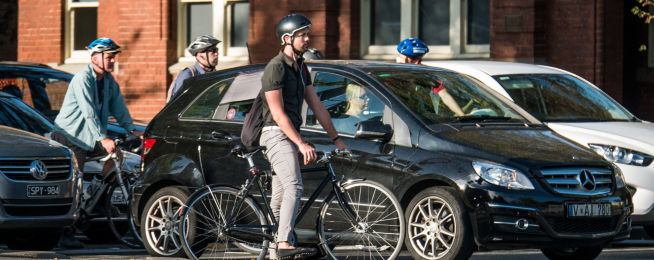A new car-focused report by the Grattan Institute recommends governments do more to make bikes a safe and appealing transport option.
The Grattan Car Plan identifies the key policies to ensure Australia has a clean and safe transport system by reducing tailpipe pollutants, switching to zero- and low-emission vehicles, and embracing alternative transport modes.
One of Grattan’s key recommendations is for Australia to adopt an ‘emissions ceiling’, a threshold level for carbon emissions and other car pollutants that all new light vehicles must not exceed.
The report emphasizes that, if we are to achieve greener, safer and more liveable cities, governments must invest in alternatives to driving. And that includes bikes.
Separated bike lanes are given the tick of approval in the report, a measure to ensure people riding bikes are safe and also feel safe. The report also advocates for lower speed limits (30km/h) in shared environments.
Congestion charges and other road charging infrastructure are recommend in the report. However, the Grattan Institute also recommends that people walking, using public transport or riding a bike should not bear the brunt of any charging infrastructure the federal or state government choose to pursue.
"Switching to cheap-to-run vehicles will be great in one way, but cheaper driving will also mean more driving, and more driving means more accidents, more congestion, and ever-increasing demands for roads and parking," Grattan says."Governments need to stifle this in advance.”
"Australia’s state governments should impose congestion charges in their capital cities, to reduce traffic congestion.
"Distance-based driving charges, COVID-safe public transport, and traffic-safe cycling would help ensure that we don’t emerge from COVID more car-dependent than we went in.
"Australians will continue to drive. What’s important is that we have safe alternatives to driving, and that when we do drive, we use the best technology to do it with as little harm as possible.”
The report says that the fear of people not being able to conveniently charge their vehicle (rather than cost price) is not the main barrier to Australians switching to electric vehicles.
"Our analysis shows this fear is overblown. Nearly two-thirds of Australian households with a car also own a detached or semi-detached home, 95 per cent of which have off-street parking,” Grattan says.
"These households will usually find it easy and inexpensive to install electric-vehicle chargers. Remaining households will be able to plug in to the publicly-accessible charging network, which is expanding rapidly.”
You can real the full report here.
Become our friend
Find out more about Bicycle Network and support us in making it easier for people to ride bikes.


